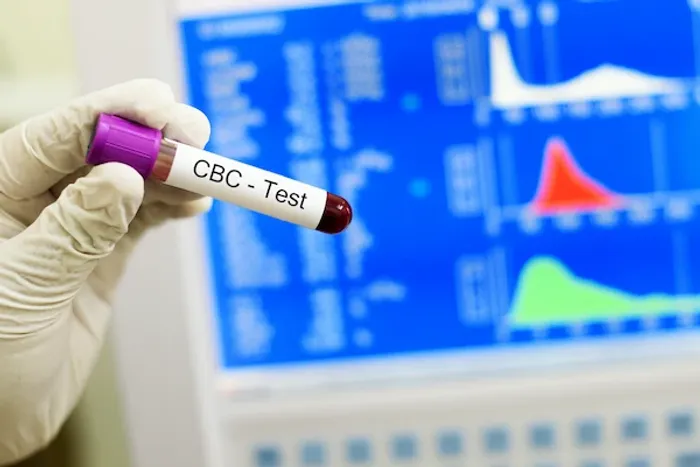Monsoon Fever? Here’s Why Your Doctor Recommends a CBC Test
Know about monsoon triggers fevers, why CBC for fever, and extra tests with CBC for fever. Learn what the CBC panel tests for monsoon fever.

Written by
Last updated on 17th Jul, 2025

Monsoon Fever? Here’s Why Your Doctor Recommends a CBC Test
Monsoon brings welcome relief from the summer heat, but it also marks the arrival of a season notorious for viral and vector-borne infections. Rising humidity, stagnant water, and increased mosquito breeding make people of all ages vulnerable to illnesses like dengue, malaria, chikungunya, and bacterial infections. Fever is often the first warning sign.
But how do doctors determine whether it’s a simple viral fever or something more serious like dengue or malaria? The answer often lies in a simple yet powerful diagnostic tool: the CBC test for fever, also known as the Complete Blood Count test.
In this article, we’ll explore why the CBC test is crucial during monsoon fever, how it helps interpret patterns like dropping platelet counts or elevated white blood cells (WBCs), and how it ties in with other seasonal tests such as the dengue malaria test.
Why Monsoon Season Triggers More Fevers?
India sees a spike in fever-related illnesses between June and September, coinciding with the monsoon. Here’s why:
- Mosquito breeding: Rainwater accumulation creates ideal breeding grounds for Aedes and Anopheles mosquitoes, carriers of dengue and malaria.
- Bacterial contamination: Waterlogging and poor sanitation increase the risk of typhoid and gastroenteritis.
- Weakened immunity: Constant dampness, lack of sunlight, and temperature fluctuations make the immune system more susceptible.
As a result, fever becomes a common yet ambiguous symptom. It could be due to a simple cold or a more serious illness like dengue or typhoid.
This is why doctors recommend early testing, starting with the CBC test for fever, to evaluate what’s happening inside your body before symptoms worsen.
What Is a CBC Test and Why Is It Recommended During Fever?
The Complete Blood Count (CBC) is a basic yet essential test that measures various components of your blood:
- White Blood Cells (WBCs): Help fight infection.
- Red Blood Cells (RBCs): Carry oxygen.
- Haemoglobin (Hb): Reflects oxygen-carrying capacity.
- Platelets: Crucial for blood clotting.
Why It Matters During Fever:
- Helps distinguish bacterial from viral causes
- Indicates infection severity
- Detects complications like thrombocytopenia (low platelets) in dengue
- Assists in tracking disease progression or recovery
The CBC test is non-invasive, inexpensive, and results are typically available within hours, making it a first-line diagnostic step for any fever, especially in monsoon.
Book a CBC Test for Fever with Apollo 24|7
Fever Pattern + CBC Report: What Doctors Look For
Your fever pattern, how it spikes, how long it lasts, and associated symptoms, offers vital clues. The CBC report adds concrete data to support or rule out certain diagnoses.
Here’s how your doctor reads the CBC alongside fever symptoms:
1. Low Platelet Count
- Common in: Dengue, chikungunya, viral fevers
- Threshold: Below 150,000 per microlitre
- Significance: Severe platelet drop (<50,000) can lead to internal bleeding, especially in dengue haemorrhagic fever
- Trend: Doctors track platelet levels daily in dengue patients to assess risk
2. High or Low WBC Count
- High WBC (>11,000/µL): Suggests bacterial infections like pneumonia or typhoid
- Low WBC (<4,000/µL): Seen in viral fevers, dengue, or bone marrow suppression
3. Elevated Neutrophils vs Lymphocytes
- Higher Neutrophils: Indicates bacterial infection
- Higher Lymphocytes: Indicates viral infection
4. Haemoglobin & RBCs
- Low levels may reflect nutritional anaemia or underlying chronic disease, which can complicate fever recovery
Explore Fever Panel with CBC, Platelets, and Infection Markers
Dengue & Malaria: Why CBC Alone Isn’t Enough
While the CBC test for fever offers critical insight, it’s not a standalone solution when dealing with monsoon-specific diseases like dengue or malaria. Doctors often combine CBC with dengue malaria tests to reach an accurate diagnosis quickly.
Dengue Tests
- NS1 Antigen: Detectable from Day 1 of fever
- IgM/IgG Antibodies: Develop later
- Why NS1 + CBC: A dropping platelet count with positive NS1 is highly suggestive of dengue
Book a Dengue Profile (NS1 , 1gM, 1gG)
Malaria Tests
- Peripheral Smear or Rapid Antigen Test
- Why CBC + Malaria Test: Repeated fever spikes with chills + low haemoglobin or anaemia could suggest malaria
Common Fever Blood Panels During Monsoon
To streamline diagnosis, Apollo 24|7 offers comprehensive fever testing panels that combine CBC, dengue, malaria, and other markers. These are ideal when the cause of fever isn’t clear.
Combo tests help reduce time and cost while increasing diagnostic accuracy.
Explore Fever Test Packages
When Should You Take a CBC or Fever Blood Test?
A fever can be caused by a variety of infections, some mild and others more serious. Knowing when to get tested is crucial for early diagnosis and timely treatment. Here are the key situations when a CBC or fever blood test is recommended:
- Fever lasting more than 2 to 3 days: Persistent fever may signal an underlying infection that needs investigation.
- High-grade fever with chills, joint pain, or rash: These symptoms could indicate illnesses like dengue, malaria, or chikungunya.
- No improvement despite taking medication: If symptoms don’t resolve, blood tests help pinpoint the exact cause.
- Recent travel to mosquito-prone or flood-hit areas: These regions carry a higher risk of vector-borne diseases like malaria and dengue.
- When recommended by your general practitioner or paediatrician: Always follow your doctor’s advice, especially for children, elderly, or immunocompromised patients.
Get These Tests If You’ve A Fever
Who Needs These Tests the Most?
Monsoon fevers can affect anyone, but certain groups are more vulnerable to complications:
1. Children
- Immature immune systems
- Higher risk of dehydration and seizures
2. Adults
- Need quick diagnosis to return to work or school
- Important to rule out mosquito-borne illnesses
3. Elderly
- Fever can mask more serious illnesses
- Need early treatment to prevent hospitalisation
4. Immunocompromised Patients
- Includes diabetics, cancer patients, transplant recipients
- Prone to rapid deterioration
How to Prepare for a CBC Test During Fever?
If you’re running a fever and your doctor has recommended a CBC test, the good news is that it’s simple and doesn’t require much preparation. Here are some quick tips to help you get ready:
- No fasting needed: You can eat and drink normally unless your doctor advises additional fasting for other tests.
- Continue your regular medications: Unless told otherwise, keep taking your prescribed medicines.
- Stay well-hydrated: Drinking water before the test can make blood sample collection easier and quicker.
- Inform the lab technician: Let them know about any symptoms (like fever, chills, or fatigue) or ongoing treatments, as these may affect your results.
- Turnaround Time: Most CBC reports are available within 4 to 6 hours, helping your doctor make faster treatment decisions.
What Do the Test Results Mean?
Below is a simplified table to help understand what certain CBC results could indicate:
Always consult your doctor for final interpretation. Self-diagnosing can be risky.
What to Do After Receiving Your CBC Test Results?
Your CBC test results can offer important clues about infections, anaemia, or other underlying health concerns. However, interpreting these values correctly is essential to avoid missteps in treatment. Here’s what you should do after receiving your report:
- Consult your doctor first: Always share the report with your healthcare provider for accurate interpretation and a personalised treatment plan.
- Avoid self-medication: Do not take antibiotics, painkillers, or supplements without medical advice, as incorrect use can worsen your condition.
- Follow up with additional tests if advised: If your doctor suspects dengue, malaria, or another illness, further testing may be necessary for confirmation.
- Monitor your symptoms: Watch for signs like increased fatigue, bleeding gums, or rashes, these could indicate a drop in platelets or worsening illness.
- Rest and stay hydrated: Proper rest, fluids, and a light diet support recovery, especially if you're fighting an infection or fever.
Conclusion
Fever is a warning sign, not a diagnosis. In the monsoon season, it’s critical not to ignore it. Whether it’s a viral flu, dengue, malaria, or something more serious, the CBC test for fever is the most reliable starting point for diagnosis. From identifying falling platelet counts to tracking immune response, the CBC test plays a vital role in managing monsoon-related illnesses.
When combined with a dengue malaria test, it offers powerful insight into the cause of fever and guides timely treatment. With Apollo 24|7, you can book your CBC and fever test

